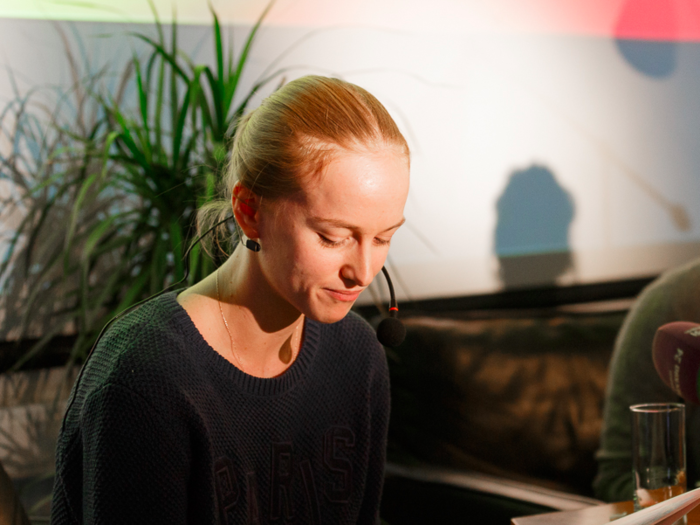
Body language expert Tonya Reiman, author of "The Power of Body Language," previously told Business Insider that job candidates should make sure they offer the "appropriate amount of eye contact."
"If you don't, the interviewer will assume you are either insecure, don't have an appropriate answer for the question being asked, or are being deceptive. Does that mean it's true? No, but perception is everything in a job interview."

Reiman said smiling demonstrates confidence, openness, warmth, and energy.
"It also sets off the mirror neurons in your listener, instructing them to smile back. Without the smile, an individual is often seen as grim or aloof," she explained.

This may give the interviewer the impression that you're bored or uninterested in the conversation. Instead, keep your hands on the desk or table, and don't fidget.
In their book "Crazy Good Interviewing," John B. Molidor, Ph.D., and Barbara Parus suggest showing your palms during an interview — since the gesture indicates sincerity — or pressing the fingertips of your hands together to form a church steeple. which displays confidence, reports Business Insider's Shana Lebowitz.

Reiman previously told Business Insider you should always be aware of your posture.
"People don't realize that the job interview begins in the waiting room, but it does. So don't slouch in the chair in the reception area," she advised. "In order to be perceived as confident, you must sit or stand tall, with your neck elongated, ears and shoulders aligned, and chest slightly protruding."
This position changes the chemicals in our brain to make us feel stronger and more confident, and it gives the outward appearance of credibility, strength, and vitality, she explained.

Playing with your hair, touching your face, or any other kind of fidgeting can be a major distraction for your interviewer. It also demonstrates a lack of power, said Reiman.

This gesture will tell the interviewer you're not comfortable or you're closed off.
"You should always keep your hands in view when you are talking," Patti Wood, a body language expert and author of "SNAP: Making the Most of First Impressions Body Language and Charisma," previously told Business Insider. "When a listener can't see your hands, they wonder what you are hiding." To look honest and credible, keep your arms uncrossed and show your hands.

"When we touch our faces or hair, it is because we need self soothing," Reiman explained.
Is that the message you want to send to your interviewer?

A weak handshake may tell the interviewer that you're nervous, shy, and that you lack confidence, explains Colin Shaw, CEO of Beyond Philosophy, a customer experience consultancy, in a LinkedIn post.
Ideally, your handshake should be firm, but not overbearing. "The secret to a great handshake is palm-to-palm contact," Wood told Business Insider. You want to slide your hand down into the web of theirs, and make palm-to-palm contact. Lock thumbs, and apply an equal amount of pressure.

"It's okay to use your hands to illustrate a few important points," writes Lebowitz. "In fact, research suggests that staying too still can give the impression of coldness.
"But relying too much on hand gestures can be distracting, according to Molidor and Parus."
She says you should remember you're in a job interview, not a theater audition.

People tend to show their dominating personality by gripping the interviewer's hand and palming it down, but this tells the interviewer that you need to feel powerful, Reiman explained. "Instead, the handshake should be more natural: thumbs in the upward position and two to three pumps up and down."
As the applicant, you should always wait for the interviewer to extend their hand first, she added.
 Internet of Things (IoT) Applications
Internet of Things (IoT) Applications
 10 Ultimate road trip routes in India for 2024
10 Ultimate road trip routes in India for 2024
 Global stocks rally even as Sensex, Nifty fall sharply on Friday
Global stocks rally even as Sensex, Nifty fall sharply on Friday

Copyright © 2024. Times Internet Limited. All rights reserved.For reprint rights. Times Syndication Service.